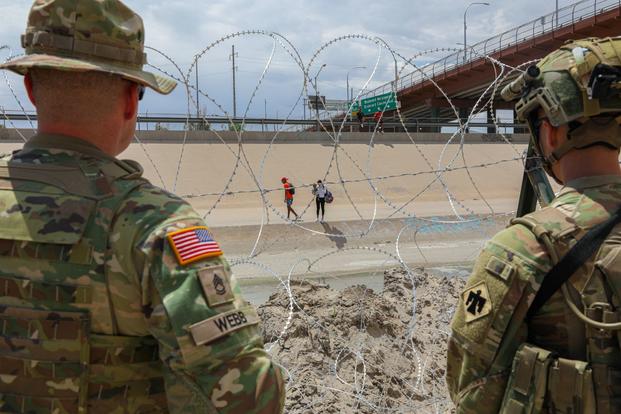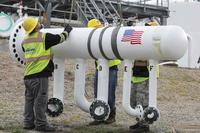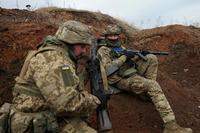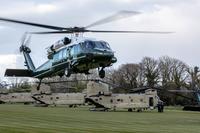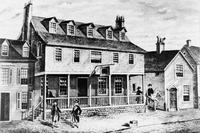EAGLE PASS, Texas — The soldiers from Louisiana stand around, sit in folding chairs and recline on the beds of Humvees, eyeing the thicket of razor wire that blankets the bank of the Rio Grande and waiting for a potential threat that rarely materializes.
When migrants clamber from the slow-moving water and probe for openings in the mass of metal, the soldiers tell them to walk back into the water.
"We stand here, we watch and we tell the immigrants to turn around," Private Christian Specks, 19, said while monitoring the river Wednesday. His uniform included sunglasses, body armor, an M4 carbine and a fleur-de-lis patch on his left shoulder.
Republican Gov. Jeff Landry sent three rotations of 50 Louisiana Army National Guard soldiers to this arid border town last month to help his Texas counterpart, Greg Abbott, amid a furor over illegal crossings and porous border security. Landry and other Louisiana Republicans have joined Abbott in railing against President Joe Biden for failing to curb an onslaught of migrants through the southern border.
But reality this week along the border in Eagle Pass looked much quieter than their rhetoric would suggest.
By the time the first rotation of Louisiana soldiers arrived and took up their positions along a sandy, windblown stretch of river just south of Eagle Pass's Shelby Park, the influx of migrants that made national headlines had ebbed. A reporter and photographer saw no one attempting to cross into Texas over a two-day visit this week.
U.S. Border Patrol officials logged just over 11,000 encounters with migrants in the agency's Del Rio sector, which encompasses Eagle Pass, in March, the last month for which data was publicly available. More than five times that many had crossed through the sector in December.
"Just before we got here, weekly, it was in the hundreds," said Capt. Zach Neely of Lake Charles, the commander of the Louisiana task force on the border. "Now it's probably dropped to less than 20 a week."
Political furor
Abbott attributes the dip in migrant crossings in recent weeks to the razor wire, airboats, stacked shipping containers and military presence he has orchestrated along the border in defiance of the federal government's authority to enforce immigration law, an operation that launched in 2021. Advocates, immigration attorneys and migrants note that the Mexican government, facing pressure from the Biden administration, started working harder recently to apprehend people traveling through the country from elsewhere in Latin America.
"The concertina wire has been up for more than two years and we have had record migration the whole time," said Amerika Garcia Grewal, an advocate with the Eagle Pass Border Coalition and native of the town. "If it worked, those numbers would have dropped as more wire went up."
It wasn't long ago that the impact of a massive rise in migration sweeping the Americas, spurred largely by economic strife and violence in Guatemala, El Salvador, Honduras and Venezuela, looked different in Eagle Pass, a city of about 30,000. Border Patrol agents in December logged over 71,000 encounters with migrants in the sector around the city — by far the highest figure of any single month over the past three years, agency data show.
Two main ports-of-entry frequented by locals in Piedras Negras, a Mexican city that lies just over the river, and Eagle Pass shut down as U.S. Customs and Border Patrol diverted resources to processing people who had climbed out of the river. The town's resources grew strained.
Gilberto Hernandez, 29, described how dozens of migrants stumbled into his family's store a few blocks from one of the border bridges when crossings soared late last year. Most were from Venezuela, he said.
"It was like there was no order," Hernandez said Wednesday during a break from ringing up customers at the store, Casa Chicho.
Migrant encounters in the Del Rio sector dropped to 16,000 in January, 14,000 in February and 11,000 in March, Border Patrol data show.
Like many in Eagle Pass, Hernandez's family and livelihood straddle the border: His father was born and raised on the Texas side and met his mother, who worked at her family's food stand in Piedras Negras, while the two were teenagers. The family store sells wares to Piedras Negras residents and ships items wholesale over the border, he said.
Hernandez understands why Abbott and other governors sent soldiers to set up shop along the river — he and his family pay taxes, he noted, and he appreciates the government stopping people from entering the U.S. without authorization.
But the way they did it, by occupying the park and golf course to its south and shuttering the facilities to the public, left something to be desired.
"To be honest, they just came in here and took over our park," he said. "That's where Eagle Pass does all our events — fourth of July, Carnival. ... Now we don't have none of that."
On the ground with the guard
The Louisiana soldiers are spaced in groups of two or three over the 1.5 mile, 400-yard-wide strip of land beginning just south of the confines of Shelby Park, which Operation Lone Star took over in January.
Churned into the sand are articles of clothing and other detritus discarded by migrants at the final stage of their journeys — a pair of small black Nike tennis shoes with the socks still tucked inside, a discarded bottle of Pepto-Bismol.
The soldiers' duties are simple: Over 12-hour shifts, they "observe and report," said Staff Sgt. Jacob Winiarski, a marine veteran, Louisiana State Police trooper and guardsman supervising other soldiers on the border.
They strike imposing figures with their rifles, camo fatigues and body armor, but say they aren't there to apprehend anyone. If migrants breach the barrier along the river, the Louisiana troops ask if they're injured then radio officials at the Texas Department of Public Safety, who in turn summon Border Patrol agents to render aid and process the migrants, many of whom hope to receive asylum.
Most can't get through the fence.
"They may stay there for hours, or try to walk down along the river," Neely said. "Eventually they just turn around and go back."
Winiarski, 30, said the border assignment was more subdued than previous deployments he made to the Middle East — despite some similarities between Texas' weather and the climate of western Iraq.
Though Louisiana shares no border with Mexico, Landry and some of the state's other Republican officials have made immigration a key part of their politics since his election last fall. Two bills Republicans are pushing through the state Legislature emulate get-tough immigration laws passed in Texas — one to outlaw cities from adopting so-called "sanctuary policies" and another that would empower local police to arrest people suspected of immigrating without authorization.
___
(c)2024 The Times-Picayune | The New Orleans Advocate
Visit The Times-Picayune | The New Orleans Advocate at www.nola.com
Distributed by Tribune Content Agency, LLC.
